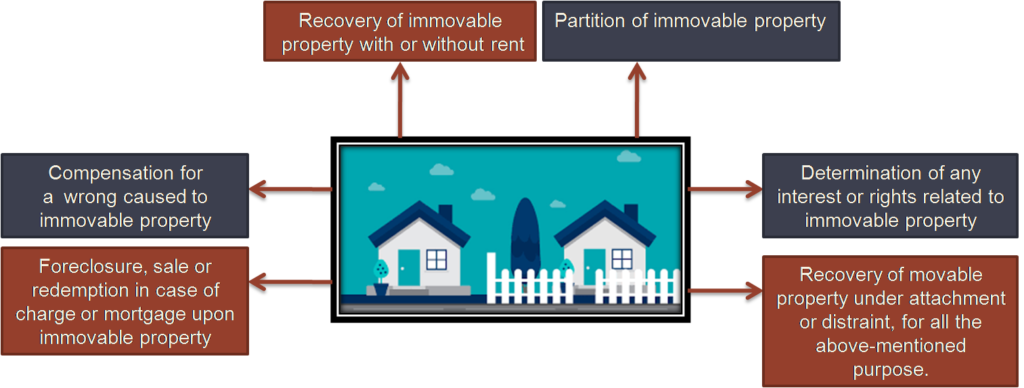Rule of Jurisdiction for Immovable Property-Section – 16
The concept of this provision is to aid the aggrieved litigant to institute a suit with respect to a subject matter, in the court, where such subject matter is situated. The purpose of the provision is to facilitate the procedure and process of the court and also to make the procurement of the evidence of such subject matter easy.
In order to determine what the territory is and which court has jurisdiction over that territory, one must look at the Civil Courts Act, not the CPC. It is the Civil Courts Act that regulates the constitution, powers and jurisdiction of civil courts in a state.
Suits to be instituted where subject-matter situate – Section – 16
Subject to the pecuniary or other limitations prescribed by any law, suits-
(a)for the recovery of immovable property with or without rent or profits,
(b) for the partition of immovable property,
(c) for foreclosure, sale or redemption in the case of a mortgage of or charge upon immovable property,
(d) for the determination of any other right to or interest in immovable property,
(e) for compensation for wrong to immovable property,
(f) for the recovery of movable property actually under distraint or attachment, shall be instituted in the Court within the local limits of whose jurisdiction the property is situate :
Provided that a suit to obtain relief respecting, or compensation for wrong to, immovable property held by or on behalf of the defendant, may where the relief sought can be entirely obtained through his personal obedience be instituted either in the Court within the local limits of whose jurisdiction the property is situate, or in the Court within the local limits of whose jurisdiction the defendant actually and voluntarily resides, or carries on business, or personally works for gain.
Explanation.– In this section “property” means property situate in India.

Following are the kinds of suits which lies under Section 16:
1.Recovery of Immovable property will include profit, rent and mesne profit.
2.For partition of Immovable property which will includes Movable as well as Immovable.
3.Suit for foreclosure, sale or redemption in case of mortgage or charge upon immovable property.
4.For determination of any other right, i.e. Right to pass property, specific performance related property, Nuisance, etc.
5.For compensation to wrong to immovable property like Trespass, Nuisance, Mischief, etc.
6.Recovery of attached Movable property.
Further Proviso to Section 16 clarifies that where a suit for compensation for wrong to immovable property, the relief can be entirely obtained through personal obedience of the defendant then it may be instituted in the court within the local limits of which
(1) Property is situate,
(2) Defendant actually and voluntarily resides; and
(3) Defendant carries on business or personally works for gain.
Proviso to Section 16 is based on the maxim equity acts in personam
‘MOHAN’ purchased some property from ‘SOHAN’. The property was situated at ‘DELHI’ but the sale deed itself was registered and the money was paid at ‘MUMBAI’. MOHAN did not get possession of the property from ‘SOHAN’, and subsequently, filed a suit against ‘SOHAN’ at ‘MUMBAI’. In this case, the court at ‘DELHI’ will have jurisdiction and not ‘MUMBAI’, because the property is situated at ‘DELHI’ and as per the rule of jurisdiction, the suit must follow the property.
Ex ample of Partition Dispute
Let us now consider a situation of partition of immovable property. The case of M.Y.A.A. Nachiappa Chettiar v. M.Y.A.A. Muthu Karuppan Chettiar concerned some joint family property. The father transferred some property to another person. The plaintiff challenged the validity of these transfers and claimed a half share in the property. The court noted that the suit should be considered to be an ordinary suit for partition of immovable joint family properties. Treating the suit as one for partition of immovable property, the court held that it would fall squarely within the rule of jurisdiction concerning the partition of immovable property, and that the case would have to be filed in the court within whose jurisdiction the disputed properties were situated. The rule is simple enough – the suit always follows the property.
LandMark Judgement On Section -16
A case for specific relief now: Harshad Chiman Lal Modi v DLF Universal Ltd. ‘H’ entered into an agreement to buy a plot of land from ‘D’. The agreement was made in Delhi. The head office of ‘D’ was situated in Gurgaon. Later, ‘D’, despite regular payments by ‘H’, canceled the contract. Thereafter, ‘H’ filed a suit against ‘D’ at Delhi. The jurisdiction of the Court was contended. The Supreme Court held that since the plaintiff was asking for a specific relief, the court would have to direct the defendant to deliver possession of the immovable property to him. Since the suit concerned the determination of a right or interest in immovable property, it was held to be an immovable property dispute, which fell under the rule of jurisdiction. Thus, the suit would have to be filed in the court within whose jurisdiction the plot of land was situated.
Summary of Sec -16 of CPC
| In conclusion, it is property that will determine where a case will be filed. The Supreme Court of India has consistently held that an action can be instituted only in a Court where the immovable property is situated. | The place where the dispute took place, the residence of the plaintiff and defendant, etc., will not be considered. These are non-issues because the issue at heart is immovable property. The purpose of this law is also worth considering. | It would be impractical and unfeasible to expect witnesses to travel to another state to testify that they saw the damage to the property being done. Further, if the court had to inspect the property for any reason and had to send someone to inspect the property, they would have to travel all the way to the property. |








No comment